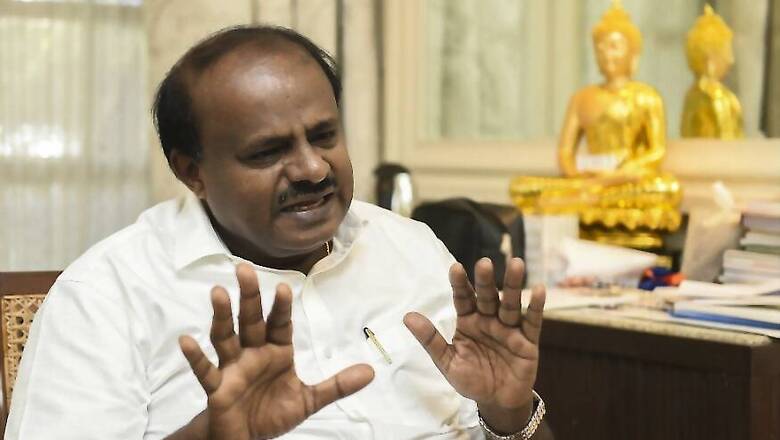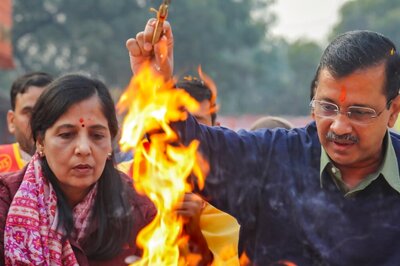
views
What John F Kennedy said about success and failure can be paraphrased in the Indian context as: coercion has a thousand fathers, while liberty is an orphan. Karnataka Chief Minister HD Kumaraswamy’s recent threat to media organisations underlines this fact.
“Whom are you [media] trying to help by misusing our name? I am thinking of bringing in a law. What have you thought of us politicians? Do you think we’re jobless? You are belittling us. Do we look like cartoon characters to you? Who gave you the authority to show everything humorously?” Kumaraswamy said at a book launch a few weeks ago.
What the Hon’ble Chief Minister seems to forget is that there is something called Article 19 of the Constitution. It states, “All citizens shall have the right (a) to freedom of speech and expression…”
It is not an absolute right. The First Amendment to the Constitution, while imposing “reasonable restrictions” on this fundamental right, specified that these pertain to the maintenance of “the security of the State, friendly relations with foreign States, public order, decency or morality, or in relation to contempt of court, defamation or incitement to an offence.”
Notice that nowhere does the Constitution mention that ridiculing somebody could be a ground for penal action. If a politician is lampooned, the security of the state is not threatened, friendly relations with foreign states don’t get adversely affected, public order is not disturbed (unless the politician’s hotheaded followers are allowed to go on a rampage by the authorities), decency or morality doesn’t suffer, and are courts not contemned.
If the lampooning is unjust and unwarranted, the act could attract the charge of defamation. But then, where is the need to bring in a new law?
Besides, if politicians behave preposterously and cartoonishly, as some of them often do, why do they and others expect not to be mocked? Don’t we live in a free country? Ridiculing the ridiculous is not and cannot be a crime, at least in a democracy.
Kumaraswamy, however, is not the only politician who is intolerant of mockery. His West Bengal counterpart, Mamata Banerjee, is little better. Priyanka Sharma, a BJP youth leader in Kolkata, learned that at her own expense. It took her four days, after considerable outcry, to get bail from the Supreme Court. She was arrested for sharing a meme on Banerjee.
Kumaraswamy and Banerjee are not the only leaders who are thin-skinned; there is a growing tribe of big shots in all parties who expect nothing but genuflection; they hate ridicule as much as they despise criticism. There have been leaders, in all parties, whose criticism and ridicule has attracted penal action; people have been arrested for mocking some of our political masters.
One of the legal provisions invoked against Priyanka Sharma was Sections 66A (offensive messages) of the Information Technology Act. It needs to be mentioned here that the Supreme Court had ruled in March 2015 that Section 66A violated the constitutional freedom of speech and expression. Yet, people continue to be charged with this draconian section. Within a year after the apex court striking it down, cops arrested over 3,000 people under it.
It is often argued that freedom of expression does not mean licence to offend or ridicule others. Why must Sharma share a meme mocking Banerjee? Or, for that matter, why should anybody ridicule the BJP, the RSS, the Congress, and their leaders?
But the point is that, as George Orwell said, if liberty means anything at all, it means the right to tell people what they do not want to hear. If you tell me that I am a great author and I let you say that, it is neither liberty nor tolerance. You enjoy liberty only if you tell me that my writing is not worth the paper it is printed on; and I am tolerant when, even if I have the power to squash you, I let you express your opinion.
And it is genuine democracy if I, however powerful I may be, cannot hurt you for the nasty things you say about me, because the law protects you.
Former US President Ronald Reagan famously cracked a joke at a press conference, highlighting the absence of free speech in the erstwhile Soviet Union. The joke was: an American and a Russian had an argument about freedom of speech in their respective countries. The American said that he could go to White House, enter the Oval Office, and tell the President, “Mr. Reagan, you are a fool!” The Russian responded, saying that he could also go to the Kremlin, enter Gorbachev’s office, and scream, “Mr. Gorbachev, Mr. Reagan is a fool!”
Our leaders can’t even tolerate jokes, let alone crack any. Can liberty survive in a country where even jest tends to get criminalised?
Ravi Shanker Kapoor is the author of ‘There Is No Such Thing As Hate Speech: A Case for Absolute Freedom of Expression’ (Bloomsbury, 2017). Views are personal.



















Comments
0 comment